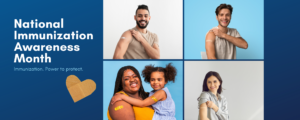
National Immunization Awareness Month (August, 2023)
Key Facts
According to the World Health Organization (WHO):
- An estimated 25 million children under the age of 1 year did not receive basic vaccines, which is the highest number since 2009.
- Immunization currently prevents 3.5-5 million deaths every year from diseases like diphtheria, tetanus, pertussis, influenza and measles.
- Vaccines train your immune system to create antibodies, just as it does when it’s exposed to a disease. However, because vaccines contain only killed or weakened forms of germs like viruses or bacteria, they do not cause the disease or put you at risk of its complications.
Raising Awareness for Immunizations
August is National Immunization Month, a time to highlight the importance of vaccination for people of all ages. With school quickly approaching, it’s time to check immunizations records to see if your kids are up to date.
In Michigan, before a child can attend kindergarten, seventh grade, childcare, or enroll in a new school district, parents or guardians are required to produce documentation that confirms their child has either received the school-required immunizations, has received at least one dose of each of the required immunizations and is awaiting receipt of subsequent doses, or has a waiver.
Vaccines protect us from dangerous preventable diseases like Chickenpox, Flu, Hepatitis, Measles, Mumps, Meningococcal, Pneumonia, Shingles, Pertussis (whooping cough), Polio and more. Vaccines not only help protect us and those we love from getting these diseases, they also help prevent spreading diseases to those that are unvaccinated.
Immunizations are not just for children. Protection from some childhood vaccines can wear off over time. Adults may also be at risk for vaccine-preventable disease due to age, job, lifestyle, travel, or health conditions.
Maternal Vaccination
- If you are pregnant, getting vaccinated can help protect your baby after birth by passing on antibodies
- These antibodies can give your baby protection from flu and whooping cough until it is time for their own vaccines
- Ask your doctor or nurse about the vaccines you need during pregnancy
Childhood/Adolescent Vaccination
- Vaccines work with your child’s natural defenses to help them safely develop protection from diseases
- Some vaccines require more than one dose to provide your child with the best protection, each recommended dose is important
- Preteens and teens need four types of vaccines to help protect against serious diseases: meningococcal vaccine to protect against meningitis and bloodstream infections; HPV vaccine to protect against cancers caused by HPV; Tdap vaccine to protect against tetanus, diphtheria and whooping cough; and a yearly flu vaccine to protect against seasonal flu
Adult Vaccination
- Every year, thousands of adults in the United States become seriously ill and are hospitalized because of diseases that vaccines can help prevent
- Many adults even die from these diseases, and by getting vaccinated, you can help protect yourself and your family from serious, sometimes deadly, diseases
- Use CDC’s adult vaccine assessment tool to see which vaccines might be recommended for your age, health conditions, job, or lifestyle
Have questions? DHD#10 is here to help answer your questions regarding immunizations in your child’s life (and adults, too).
Call us at 888-217-3904 to schedule your vaccines today.
Quick Links
